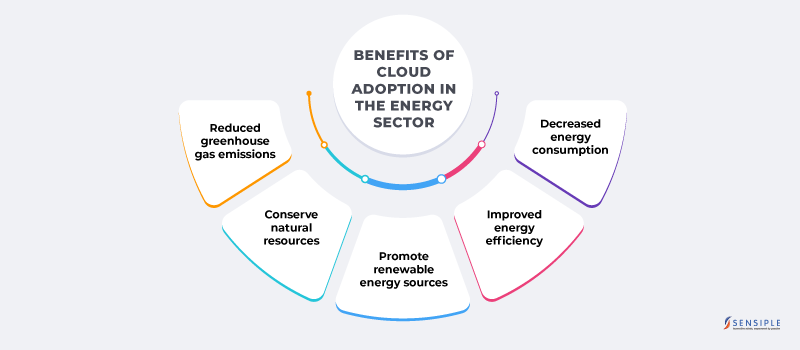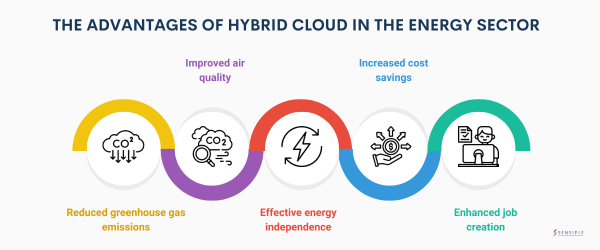Today’s energy sector is undergoing a significant transformation, with a pressing need to transition towards cleaner and more sustainable energy sources. One effective approach to facilitate this change is through the adoption of hybrid cloud infrastructure. The emergence of hybrid cloud infrastructure decreases the use of fossil fuels that contribute to greenhouse gas emissions. Hybrid cloud infrastructure can also help to increase the use of renewable sources like wind, solar, and hydropower.
Fun fact: Did you know that the global electricity access rate increased from 83 percent to 91 percent in 2021. Nowadays, countries are actively striving to reduce carbon emissions by shifting to renewable energy, data storage, management, and analysis. However, the energy sector continues to face a global challenge in the form of escalating ecological costs.
Why must Energy Businesses Adopt Cloud-Based Solutions:
Adopting Cloud services is key to minimizing the energy sector’s ecological cost and promoting energy efficiency. A collaborative study by Microsoft and WSP suggests that cloud computing can significantly enhance energy efficiency by up to 93% and reduce greenhouse gas emissions by up to 98% compared to on-premises IT infrastructure.

Cloud technology has emerged as a vital tool for energy companies, enabling effective data management and utilization. This shift is driven by several factors, including the imperative to minimize greenhouse gas emissions and the decreasing cost of renewable energy. Additionally, the advent of innovative technologies like storage and smart grids further contributes to this transformative trend. The integration of cloud technology plays a crucial role in reducing ecological costs and fostering sustainability in the energy sector.
How Cloud technology helps to reduce ecological costs?
Cloud technology can help reduce ecological costs in several ways:
By Increasing Energy Efficiency: Cloud providers help data centers optimize energy efficiency, reducing operating costs. Cloud services use cooling systems or implements which consume less power.
By Enhancing Server Consolidation: Cloud services with consolidated servers can reduce physical servers and lessen ecological costs. It may reduce the energy needed to power and cool the servers and the required physical space.
By Improving Virtualization Capabilities: Cloud providers use virtualization capabilities on a single physical server to run multiple virtual machines. It can increase server utilization rates by achieving higher efficiency and reducing the number of physical servers needed.
Cloud providers utilize virtualization technology on a single physical server to run multiple virtual machines.
By Enabling More Renewable Energy: Many cloud providers are committed to using renewable energy sources such as solar, wind, or hydropower to power their data centers. By using renewable energy, they reduce their carbon footprint and help to reduce the overall impact on the environment.
By Adopting More Remote Work: Cloud technology also enables remote work, reducing employees’ need to commute to a physical office. It can lead to a vital reduction in carbon emissions from transportation.
The New Energy Future with Hybrid Cloud Platforms:
As we shift towards a more sustainable and renewable energy future, we can expect many benefits, including cleaner air, reduced greenhouse gas emissions, and a more stable and secure energy supply.
Technological advances will drive the future of energy, changing societal attitudes toward sustainability and evolving government policies. Here are a few potential developments in the energy field that could shape the “new energy future,”: Renewable energy sources, Energy storage technology, Smart grids, and Electric vehicles.
An energy future with a hybrid cloud delivers significant environmental, economic, and social advantages.

How Microsoft Azure Helps Improve Energy Efficiency:
Microsoft Azure provides companies across different industries with digital transformation solutions to optimize customer experience, modernize workflows, enhance operational efficiencies, and lower costs. By collaborating with Azure, enterprises can align with their focus on mitigating environmental impacts on local communities – carbon, water, waste, and ecosystems. Azure has set ambitious goals, including,
- Achieving 100% renewable energy by 2025
- Becoming water positive by 2030
- Obtaining zero-waste certification by 2030
- Ensuring net-zero deforestation for new construction
Businesses can take advantage of these sustainability initiatives to support a cleaner and more sustainable future by partnering with Azure.
Unlock the capabilities of Azure Hybrid Cloud with Sensiple:
The energy sector’s reliance on hybrid cloud solutions continues to grow, and this trend is expected to persist into 2023. As companies increasingly recognize the advantages offered by hybrid cloud platforms—such as improved efficiency, cost reduction, and enhanced agility—it becomes crucial for businesses to seize the potential of Azure hybrid cloud solutions. By partnering with a trusted cloud provider, companies can ensure their needs are met, driving growth and success.
At Sensiple, we stand out as a Microsoft solutions partner with specialized expertise in Azure, backed by over two decades of experience within the Microsoft ecosystem. Our team brings unparalleled expertise and a customer-centric approach to guide you through every stage of your cloud transformation journey. With our certified Cloud Architects, you can leverage Azure’s highly resilient infrastructure to modernize your applications and harness the flexibility of hybrid cloud solutions.
Maximize the benefits of Azure’s hybrid cloud services for your energy business, empowering it with enhanced energy efficiency and streamlined business processes. Contact us today at info@sensiple.com to embark on this transformative journey!







